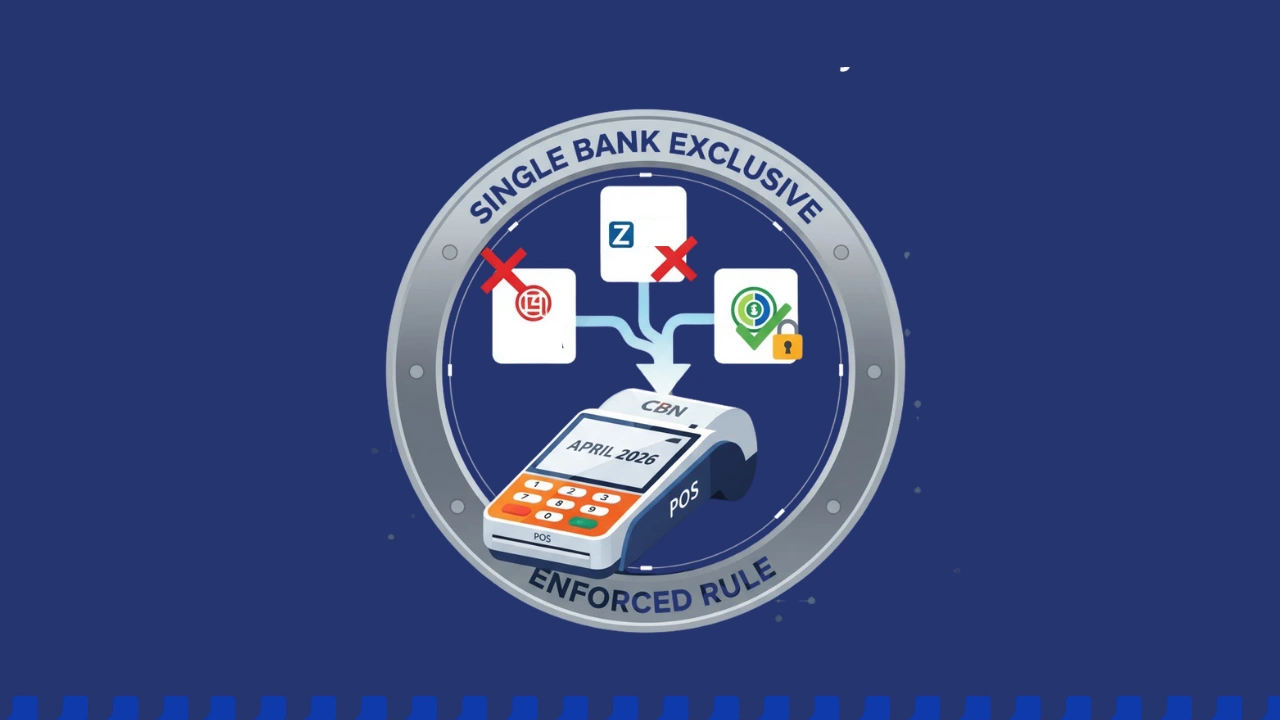The Central Bank of Nigeria has unveiled comprehensive regulations that will fundamentally reshape the country’s Point-of-Sale (POS) and agent banking sector. Announced on October 6, 2025, the new guidelines introduce an exclusivity rule that mandates all POS agents and banking operators to affiliate with only one principal institution.
Under the new framework, each agent can operate under just one commercial bank, microfinance institution, payment service bank, or mobile money operator. This means agents currently working with multiple fintech platforms such as Moniepoint, OPay, and PalmPay must choose a single financial partner when the exclusivity rule officially takes effect on April 1, 2026.
The regulation affects over two million POS agents operating across Nigeria’s estimated five to six million POS devices. According to data from the Nigeria Inter-Bank Settlement System, there were 8.36 million registered POS terminals as of March 2025, with 5.90 million active terminals serving the country’s growing cashless economy.
“The move aims to improve traceability, reduce oversight gaps, curb fraud, and simplify regulation in the fast-growing agent network,” the CBN stated in its official guidelines.
The regulator observed that multi-principal agents often exploit system gaps, resulting in issues like double-booking and cloned terminals.
The exclusivity rule accompanies other stringent measures designed to strengthen Nigeria’s financial infrastructure. The CBN has capped daily POS transactions at 1.2 million naira (approximately $823.32) per agent and 100,000 naira per customer. Additionally, new geo-fencing rules confine agents to a 10-metre operational radius, while mandatory geo-tagging captures real-time location data of POS terminals.
Complementing the POS restrictions, the CBN released draft guidelines in October 2025 requiring banks to deploy one ATM for every 5,000 payment cards they issue. Zenith Bank, which has issued 27.80 million cards and currently operates 2,142 ATM terminals, would need to expand its network to at least 5,561 ATMs by 2028 under the new mandate.
Nigeria currently has only 14 ATMs per 100,000 adults, compared to 31 in Egypt, according to International Monetary Fund data. The number of active ATMs fell to 16,714 in the first half of 2024, down from 17,377 the previous year. The new guidelines establish a phased compliance schedule requiring banks to deploy 30 percent of required ATMs by 2026, 60 percent by 2027, and achieve full compliance by 2028.
The regulations have sparked concerns among industry stakeholders about potential impacts on financial inclusion. Some agents, particularly smaller operators, may struggle to secure exclusive partnerships with larger institutions, potentially reducing financial access points in underserved areas. Market analysts warn that the rule could lead to market concentration, with agents gravitating toward dominant players offering better terms.

However, the CBN argues that exclusivity will foster stronger partnerships between agents and their principals. With banks now fully responsible for their agents, financial institutions may provide better training, liquidity support, and oversight, ultimately improving service quality and compliance standards.
Financial technology companies and payment service providers face increased competitive pressure under the new framework. Each institution must now work harder to attract and retain agents, potentially leading to higher recruitment costs. Smaller fintechs might struggle to compete with larger, well-funded rivals that can offer superior commission rates and settlement reliability.
For consumers, the regulations present mixed implications. Increased oversight and accountability may boost public confidence and reduce fraud cases in POS transactions. However, customers in rural or low-traffic areas might experience reduced service access as some agents who previously served clients from multiple institutions may no longer cater to all customers.
The regulatory changes also include tightened agent eligibility requirements, mandating clean credit records, valid Bank Verification Numbers, and approved business premises. Failed ATM transactions must be refunded within 24 to 48 hours, and two percent of all ATMs must be equipped with tactile features for visually impaired users.
The CBN has opened the draft ATM guidelines for public comments over the next four weeks, signaling potential adjustments before final implementation. Regardless of modifications, the central bank has made clear its intention to reshape access to cash and digital payments across Nigeria’s economy.
Industry experts advise agents to carefully evaluate potential principals before committing, considering factors like commission structures, settlement reliability, liquidity support, and customer service quality. Banks and fintechs must strengthen risk management frameworks while offering comprehensive training to agents during the transition period.
With enforcement scheduled for April 2026, the coming months will prove crucial in determining whether these reforms strengthen or destabilize Nigeria’s rapidly growing digital financial ecosystem. The success of the policy depends largely on how well stakeholders adapt during the transition period and whether the CBN can balance regulatory discipline with flexibility to protect financial inclusion gains.
